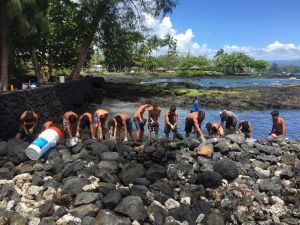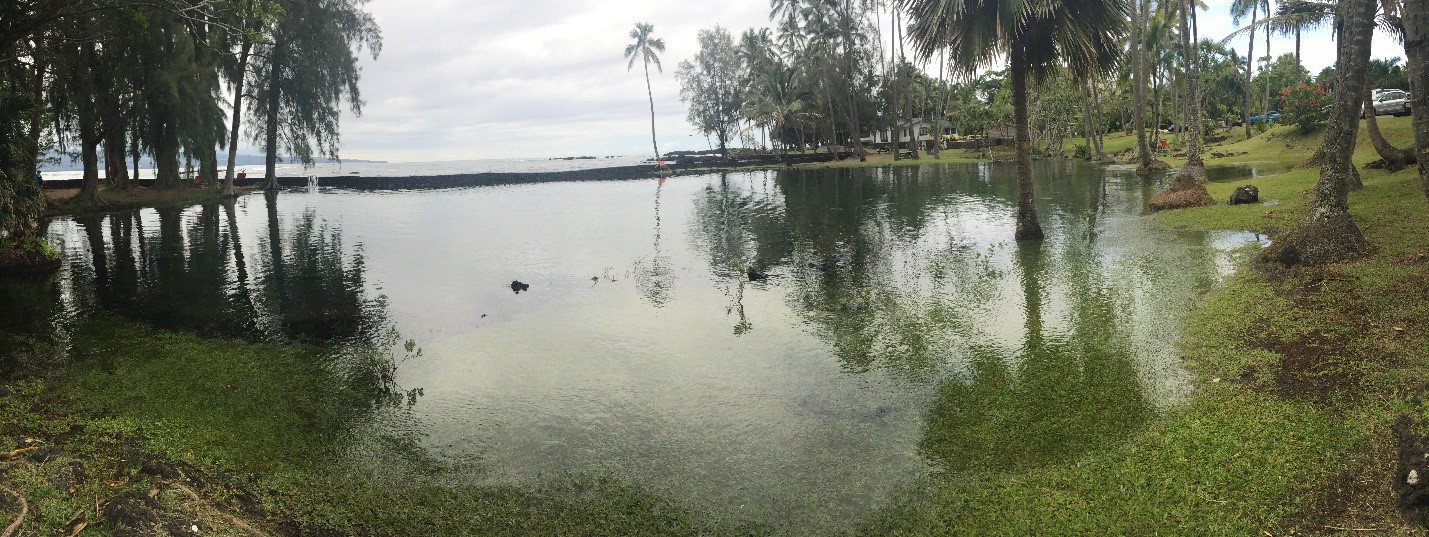Impacts of climate change in loko i‘a (traditional Hawaiian fishponds) management II

On the east side of Moku o Keawe (Hawai‘i Island), along the Keaukaha coastline, there is a valuable and critical resource known for its brackish water habitat. This ecosystem occurs in the near shore zones where upwelling groundwater and marine seawater meet at the shoreline. Brackish water habitats serve as a sustainable food source for coastal communities and as a result, the environmental health of these systems is closely tied to the survival of many Kānaka Maoli (Native Hawaiian) cultural practices. This study assesses the potential impacts of climate change on the coastline of Keaukaha in the Hilo district of Hawai‘i Island. Sea-level rise, in particular, is of growing concern for the community because the low-lying coastal zone relies on the sustainable brackish water ecosystem. Saltwater intrusion could drastically alter not just the habitat, but also impact the cultural practices since many traditions are associated with these environments. For example, there are traditional gatherings at loko i‘a (Hawaiian fishponds) and storytelling during the gatherings that teach the Kanaka Maoli cultural practices. This study will focus on the impacts of climate change on loko i‘a, but it will also seek to determine if Hawaiian fishpond restoration is advantageous for mitigating environmental changes to the brackish water ecosystems of Keaukaha, Hawai‘i.

Project Collaborators
Masters Student
- Kamala Anthony, Fishpond Manager (Honokea Loko) and graduate student
Faculty Advisor
- Steven “Steve” Colbert, Associate Professor of Marine Science, University of Hawaiʻi at Hilo
Committee Members
- Blake McNaughton, Fishpond Manager (Waiāhole and Kapalaho loko iʻa), Kumuola Science Education Center, Kamehameha Schools
- Troy Sakihara, Division of Aquatic Resources, Department of Land and Natural Resources
- Becky Ostertag, Professor, Biology; Program Chair, M.S. in Tropical Conservation Biology and Environmental Science
Additional Collaborators
- Luka Mossman, Manager, Hale o Lono Fishpond, Edith Kanakaʻole Foundation and Conservation International Hawaiʻi
- John Burns, Lecturer/Researcher, Marine Science, University of Hawaiʻi at Hilo
- Jason Adolf, Associate Professor (Marine Science), Dept. of Biology, Monmouth University
Graduate defense presentation (7/10/18)
MCC Loko Iʻa Project Voice of the Sea Feature
MCC Loko Iʻa Collaborative Restoration PICCC Film
E LAUHOE MAI: Redefining “classroom” in Keaukaha video
PI-CASC News: “Hawaiʻi Tribune Herald Article Outlines Senate Climate Change Bill and Highlights MCC Research”
UH Hilo Stories: “Climate change research at UH Hilo: Fishpond management and restoration”
PROJECT DETAILS
FUNDED:
FY2016
PI:
Steven Colbert
Associate Professor of Marine Science, UH Hilo
Graduate Scholar:
Kamala Anthony
Tropical Conservation Biology & Environmental Science
UH Hilo
Co-Is:
Blake McNaughton
Kumuola Marine Science Education Center
Kamehameha Schools
Troy Sakihara
DLNR Division of Aquatic Resources
Becky Ostertag
Tropical Conservation Biology & Environmental Science
UH Hilo
Luka Mossman
Kiaʻi Loko, Edith Kanakaʻole Foundation
Fisheries Outreach Coordinator, Conservation International
John Burns
Marine Science Researcher
UH Hilo
Jason Adolf
Professor of Marine Science
Monmouth University

